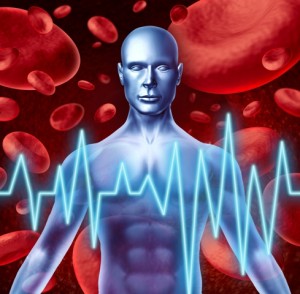 If you’re interested in health and nutrition, you’ve almost certainly heard about free radicals and the damage they can cause. You’ve also probably heard that antioxidants can prevent free radical damage.
If you’re interested in health and nutrition, you’ve almost certainly heard about free radicals and the damage they can cause. You’ve also probably heard that antioxidants can prevent free radical damage.
Here’s how free radicals can harm you, and how antioxidants can help keep you healthy.
A Little Chemistry
To understand what free radicals do, you’ll have to think back to your high school chemistry class, when you learned about atoms and molecules. Atoms are the basic building blocks of everything in the universe. Everything in the world, including all the cells in our bodies, is made of atoms.
Quiz: Is Your Body TOXIC? Take the Test...
(get your free personalized report)
An atom contains a nucleus, which is surrounded by electrons.
When atoms combine, they form molecules. They do this either by transferring electrons from one atom to another, forming an ionic bond, or by sharing electrons, forming a covalent bond.
Usually, the electrons in a molecule come in pairs. Sometimes, when a covalent bond breaks, and the two atoms it was joining separate, an electron pair will break up, so each atom gets just one electron of the pair.
These atoms with unpaired electrons are known as free radicals.
How Free Radicals Could Hurt You
Free radicals are oxidizers: molecules that grab electrons from other molecules. A free radical steals an electron from another molecule to create a match for its unpaired electron. After it loses an electron, this other molecule itself becomes a free radical. A chain reaction begins, with more and more free radicals being created.
Quiz: Is Your Body TOXIC? Take the Test...
(personalized report)
Your body is always producing free radicals. To convert food and oxygen into energy, your cells perform a chemical reaction that creates free radicals. These free radicals can cause damage to other molecules in your cells, including your DNA.
Antioxidants
An antioxidant is a chemical that reacts with free radicals to stop the chain reaction.
When your body doesn’t have enough antioxidants to prevent free radical damage, you develop a condition known as oxidative stress.
Some research shows that oxidative stress is associated with diseases like Alzheimer’s disease, Parkinson’s disease, arthritis, heart disease and cancer.
Scientists aren’t entirely sure whether free radicals actually cause these diseases, and are still carrying out research to learn more. However, we do know that people with Alzheimer’s disease have low levels of the antioxidant Vitamin E, and giving them Vitamin E supplements appears to slow the progression of the disease.
Rats genetically engineered to have low levels of naturally occurring antioxidants are more likely to develop liver cancer than normal rats.
Free Radicals, Antioxidants and Aging
Since the 1950s, researchers have thought that oxidative stress might contribute to aging. Studies show that free radical damage is associated with aging in mice, fruit flies and yeast.
However, recent research on Caenorhabditis elegans, a type of roundworm, shows that free radicals might actually help you live longer. Some researchers think that when cells experience low levels of oxidative stress, it becomes easier for them to handle high levels of stress. Small amounts of free radicals could be better than no free radicals at all, and levels of antioxidants that are too high might be dangerous.
It’s possible that people with serious degenerative disease have high levels of free radicals, because cells are producing more free radicals to try and make themselves better; the free radicals are helping, not hurting.
Where to Find Antioxidants
All of your cells have a very powerful naturally occurring antioxidant called superoxide dismutase (SOD). As you grow older, your levels of SOD decline, making free radical damage more likely. You can buy SOD as a supplement. Scientists study the effects of free radical damage in animals by genetically engineering them to produce less SOD.
You can find many other antioxidants in foods. These antioxidants include:
- Vitamin A – Sources include liver, fish oil, eggs, tomatoes, carrots, squash and broccoli
- Vitamin C – Found in citrus fruits, tomatoes, strawberries, potatoes, peppers and other fruits and vegetables
- Vitamin E – In nuts, seeds, vegetable oils and leafy green vegetables
- Lycopene – Found in tomatoes
Many foods contain antioxidants known as polyphenols. Green tea contains polyphenols known as catechins. Flavonoids, another kind of polyphenol, are found in black tea, red wine and dark chocolate.
Additional Sources:
- Aging: a theory based on free radical and radiation chemistry, Journal of Gerontology, 1956.
- Antioxidants and Cancer Prevention, National Cancer Institute
- Dietary Supplement Fact Sheets, National Institutes of Health
- Free radicals and antioxidants in normal physiological functions and human disease, The International Journal of Biochemistry & Cell Biology, 2007
- Genome-wide study of aging and oxidative stress response in Drosophilamelanogaster, Proceedings of the National Academy of Sciences, 2005
- Reactive oxygen/nitrogen species and their functional correlations in neurodegenerative diseases, Journal of Neural Transmission, 2012
